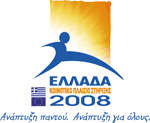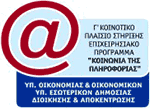- Music Information Activities
- News
- Current weekly Newsletter (in Greek)
- Newsletters Archive (in Greek)
PROJECT
Digitization, Documentation and Promotion of the Greek Music Culture
 |
 |
 |
 |
||
| GREEK DEMOCRACY MINSTRY OF FINANCE MINISTRY OF CULTURE |
Community Support Framework for Greece
|
THE CURRENT PROJECT IS FINANCED BY 75% FROM EU AND 25% FROM NATIONAL SOURCES |
|||
DIGITIZATION
Important collections of music and documents are today in the possession of a number of organizations (cultural associations, composers’ unions, museums a.o.) as well as individuals. This material constitutes the Music Heritage of Greece and remains scattered, sometimes terribly inaccessible and facing the danger of destruction since there has never been a coordinated effort to document or digitize it.
One of the main objectives of the Institute is the preservation of Greek Music. Therefore in December 2001, IEMA organized the “1st Pan-Hellenic Symposium on Music Research” (site available only in Greek) at the Ministry of Culture. The Symposium resulted in a proposition for the digitization, the development and the presentation of Greek Music Culture.
The proposition was submitted in 2003 to the Special Secretariat for the “Information Society” Operational Programme of the Ministry of Finance in the framework of invitation 65 that concerned “Documentation, development and promotion of Greek Culture”. After it was evaluated it was granted with a budget of 650.000 €, covered by 75% from the European Union and by 25% by the Ministry of Culture.
The project articulates in the following sub-projects:
• Creation of a digitization, documentation and preservation centre for the Greek Music Heritage.
• Development of digital archive of the Greek Music Culture.
IEMA’s intentions are the following:
1. The development of a digitization, documentation and preservation centre for music archives. The centre will have the necessary infrastructure, equipment and human resources as to:
• Ensure high-quality digitization of the music articles with simultaneous high speed
• Have both immobile and mobile digitization units
• Be able to properly and operationally manage the digitized material (multimedia digital databases)
• Scientifically and prudentially document the material (descriptions and comments of the articles)
• Preserve the digitized material in appropriate conditions, as well as the original, when needed
2. The development of a digital archive of Newer and Contemporary Greek Music Culture, through the collaboration with a large and representative number of music archives and collections, as well as with personal composers’ archives.
The total posessing music archive material available are
|
Type of Document
|
Unit
|
Amount
|
|
Recordings
|
Hours
|
22.586
|
|
Records 78rpm
|
Items
|
13.485
|
|
Records 33rpm
|
Items
|
7.195
|
|
Records 45rpm
|
Items
|
5.310
|
|
Music scores
|
Pages
|
176.180
|
|
Other manuscripts
|
Pages
|
131.710
|
|
Photos
|
Items
|
65.950
|
|
Printed material (programs, reviews)
|
Items
|
37.050
|
|
Books
|
Items
|
7.628
|
|
Video-films
|
Items
|
681
|
|
Music Instruments
|
Items
|
2.320
|
|
Periodicals
|
Pages
|
3.470
|
|
Drawings, pictures, carte-postals
|
Items
|
4.640
|
In the frame of the current project only a part of this material (10-20%) is digitized..
PROMOTION
One of the Institute’s main goals is to promote Greek Music. To that end IEMA organized, in December 2001, at the Ministry of Culture, the “1st Pan-Hellenic Symposium on Music Research” (only in Greek). The symposium’s conclusions became the ground-work for a proposition for the digitization, development and promotion of Greek Music Culture.
The Institute's activities can be analyzed as follows:
1. Creation of specialized site dedicated to the promotion of Greek Music
The aim is to promote significant sides of the Greek Music Culture, by tapping the resources the internet provides, in order to attract national and international interest. In the framework of this sub-program a thematic website is planned, which will be the National Web Portal and will comprehensively present Greek Music, in an integrated, documented manner, with detailed presentation of all the expressions of Greek Culture from Antiquity to our days. The portal will host a large amount of representative multimedia material, with informative and educational dimensions in at least two languages. Moreover, the portal will contain information regarding contemporary music life in Greece (organizations, groups, musicians etc.)
2. Production of digital publications for the public and for education
In order to diffuse Greek Music in education as well as abroad, IEMA plans the production of a CD-ROMs on specialized thematic approaches of Greek Music Culture. These thematic unities are:
- Music in Ancient Greece
- Music in Byzantine and Post-Byzantine times
- Greek Traditional Folk Music
- Urban Music – From the “Rebetiko” until today
- Newer and Contemporary Greek Music
The CD-ROM will be bi-lingual and supported by educational multimedia applications, sound samples, scores, videos, explanatory texts, photos and educational games.
SPECIFICATIONS FOR THE DIGITIZATION of MUSIC AND SOUND
Apart from the Program of Digitization, Documentation and Promotion of Greek Music Culture, the Technical University of Athens appointed a team of IEMA associates to come up with a study of the specifications and good practices for the digitization of sound and music. This study is constituting a principles guide for all the digitizations of sound and music projects that are integrated in the “Information Society” program.
The various sub-propositions and activities have been designed as to constitute an interdependent body with internal synergies. It is a complete proposition for a project undertaken for the first time in Greece and it lays the ground-work for the creation of the National Archive of Greek Music.
The team responsible for the design and implementation of the program is composed by: Kostas Moschos, Nikos Valkanos, Nikos Dionysopoulos, Anargyros Deniozos, Christos Chatzistamou, Yiannis Mourtzopoulos and Foteini Aravani.
The study is available as PDF here:


 Hellenic
Hellenic  English
English